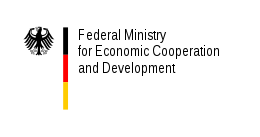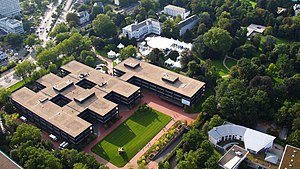
Back وزارة التعاون الاقتصادي والتنمية Arabic Bundesministerium für wirtschaftliche Zusammenarbeit und Entwicklung German Ministerio Federal de Cooperación Económica y Desarrollo (Alemania) Spanish وزارت همکاریهای اقتصادی و توسعه (آلمان) Persian Ministère fédéral de la Coopération économique French המשרד לפיתוח ושיתוף כלכלי (גרמניה) HE Տնտեսական համագործակցության և զարգացման դաշնային նախարարություն Armenian Africa Cloud Japanese 연방경제협력개발부 Korean Administer Foederalis Collaborationis Oeconomicae Latin
| Bundesministerium für wirtschaftliche Zusammenarbeit und Entwicklung (BMZ) | |
 | |
 Offices of the BMZ in the former Federal Chancellery in Bonn | |
| Agency overview | |
|---|---|
| Formed | 14 November 1961 |
| Jurisdiction | Government of Germany |
| Headquarters | Dahlmannstraße 4, 53113 Bonn |
| Employees | approx. 1,100 |
| Annual budget | €12.426 billion (2021)[1] |
| Minister responsible |
|
| Agency executives |
|
| Website | http://www.bmz.de |
The Federal Ministry for Economic Cooperation and Development (German: Bundesministerium für wirtschaftliche Zusammenarbeit und Entwicklung, pronounced [ˈbʊndəsminɪsˌteːʁiʊm fyːɐ̯ ˈvɪʁtʃaftlɪçə t͡suˈzamənˌʔaʁbaɪ̯t ʊnt ɛntˈvɪklʊŋ] ⓘ), abbreviated BMZ, is a cabinet-level ministry of the Federal Republic of Germany. Its main office is at the former German Chancellery in Bonn with a second major office at the Europahaus in Berlin.
Founded in 1961, the Ministry works to encourage economic development within Germany and in other countries through international cooperation and partnerships. It cooperates with international organizations involved in development including the International Monetary Fund, World Bank, and the United Nations.
Germany is the second-largest development co-operation provider of the Development Assistance Committee (DAC). Bilateral co-operation constitutes the bulk of Germany’s official development assistance (ODA), under the overall lead of the Federal Ministry for Economic Cooperation and Development (BMZ), while the Federal Foreign Office oversees humanitarian aid, crisis prevention, stabilisation and peace-building.
According to the OECD, Germany’s total ODA (USD 35 billion, preliminary data) increased in 2022 due to an increase in in-donor refugee costs and increased contributions to international organisations. It represented 0.83% of gross national income (GNI).[2]
- ^ "Bundeshaushalt". www.bundeshaushalt.de. Retrieved 10 May 2021.
- ^ "OECD Development Co-operation Profiles". Retrieved 15 September 2023.
© MMXXIII Rich X Search. We shall prevail. All rights reserved. Rich X Search